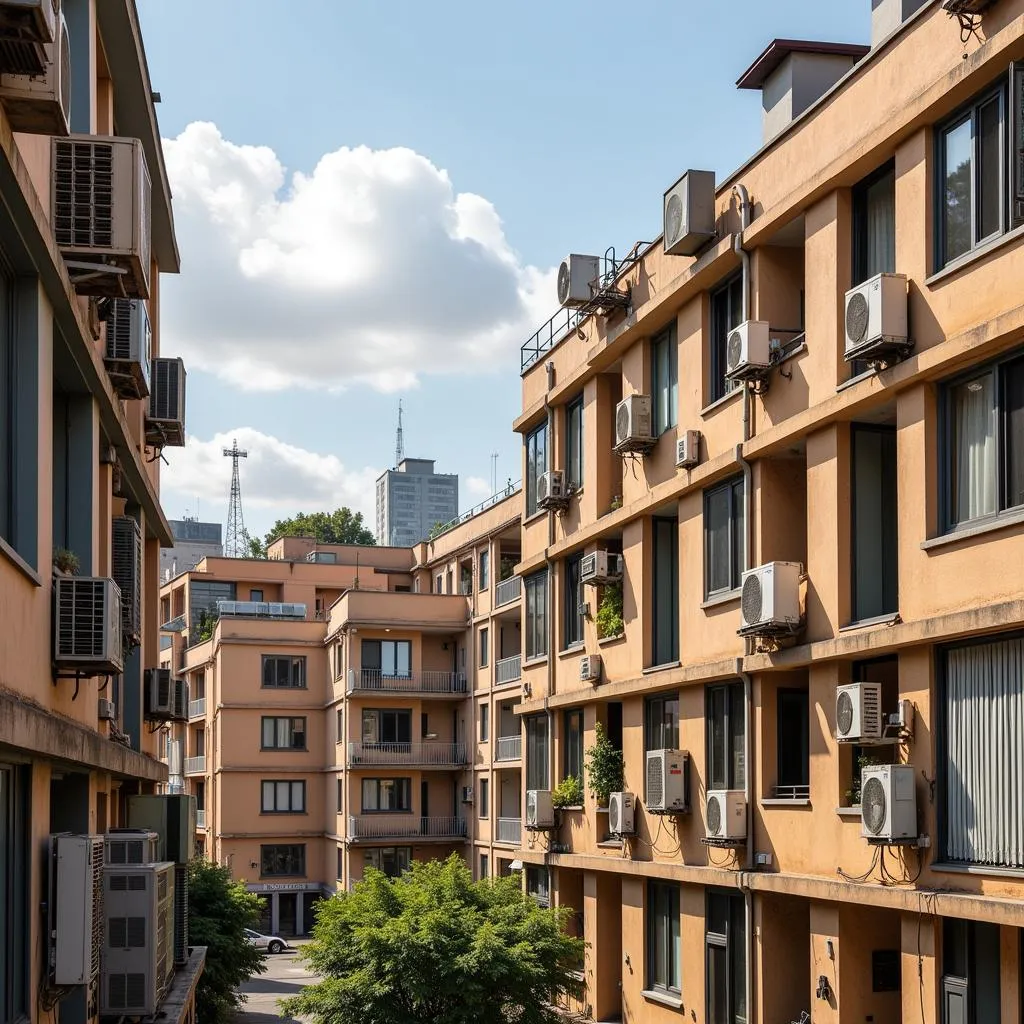Exploring African Capital AC: Climate Control in the Heart of the Continent
As temperatures rise globally, access to reliable air conditioning (AC) becomes less of a luxury and more of a necessity, especially in Africa. The continent faces unique challenges with extreme heat and humidity, impacting the health, productivity, and overall well-being of its people. This exploration delves into the increasing significance of “African Capital Ac”, examining its impact on various aspects of life across the continent.
The Growing Need for AC in Africa
 Modern African cityscape with air conditioning units visible on buildings
Modern African cityscape with air conditioning units visible on buildings
With a rapidly growing population and increasing urbanization, the demand for AC in Africa is skyrocketing. Urban centers, in particular, experience heightened temperatures due to the “urban heat island effect” where concrete and asphalt absorb and retain heat. This, coupled with unreliable electricity grids in certain regions, presents significant challenges to providing adequate cooling solutions.
Access to AC is not just about comfort; it’s crucial for numerous sectors:
- Healthcare: Maintaining optimal temperatures within hospitals and healthcare facilities is vital for patient recovery and the efficacy of medications.
- Education: Learning environments equipped with AC improve student concentration and academic performance.
- Economy: Comfortable working conditions boost productivity in offices, factories, and other workplaces.
- Technology: Sensitive electronic equipment, crucial for communication and data storage, requires climate-controlled environments to function optimally.
Addressing the Challenges: Sustainable Cooling Solutions
While the need for AC is clear, it’s essential to address it sustainably. Traditional AC units contribute significantly to greenhouse gas emissions. Therefore, African nations are exploring and implementing innovative approaches:
- Renewable Energy Sources: Integrating solar-powered AC units and promoting renewable energy sources for electricity generation are crucial steps towards eco-friendly cooling.
- Energy-Efficient Technologies: Encouraging the adoption of energy-efficient AC units with higher energy ratings can significantly reduce energy consumption.
- Passive Cooling Techniques: Incorporating traditional African architectural design principles, such as natural ventilation and shading, can minimize the reliance on mechanical cooling systems.
The Socioeconomic Impact of AC Access
 An African family relaxes in their living room, cooled by an air conditioner
An African family relaxes in their living room, cooled by an air conditioner
The availability of AC significantly impacts the socioeconomic landscape of Africa:
- Improved Health Outcomes: AC can reduce the incidence of heatstroke, respiratory problems, and other heat-related illnesses, leading to a healthier population.
- Enhanced Productivity: Comfortable working and living conditions result in increased productivity and economic output.
- Reduced Inequality: Providing access to AC across all socioeconomic levels can bridge the gap between the haves and have-nots, fostering greater social equity.
Looking Ahead: AC as a Catalyst for Development
Investing in sustainable cooling solutions is not just an environmental imperative; it’s a crucial step towards achieving broader development goals in Africa. Access to “African capital AC” can empower communities, drive economic growth, and improve the overall quality of life for millions.
As the continent continues to develop, it’s essential to prioritize sustainable and equitable access to AC, ensuring that its benefits reach all corners of society. By doing so, Africa can pave the way for a cooler, healthier, and more prosperous future.
FAQs about African Capital AC:
- What are some of the challenges to AC access in Africa? Challenges include high costs, unreliable electricity grids in certain regions, and the environmental impact of traditional AC units.
- How can Africa adopt AC in a more sustainable way? By focusing on renewable energy sources, energy-efficient technologies, and incorporating traditional passive cooling techniques.
- Why is AC important for Africa’s development? AC improves health outcomes, boosts productivity, and can contribute to a more equitable society.
Do you have other questions about Africa?
You might find these articles helpful:
- Curious about the capital of a specific West African country? Find out the answer here: accra is the capital of which west african country.
- Test your knowledge of the continent with our african history quiz questions and answers.
- Interested in the economic landscape? Explore the african countries with highest gdp.
For further inquiries or assistance, please don’t hesitate to contact us:
Phone: +255768904061
Email: kaka.mag@gmail.com
Address: Mbarali DC Mawindi, Kangaga, Tanzania
We are available 24/7 to assist you!


